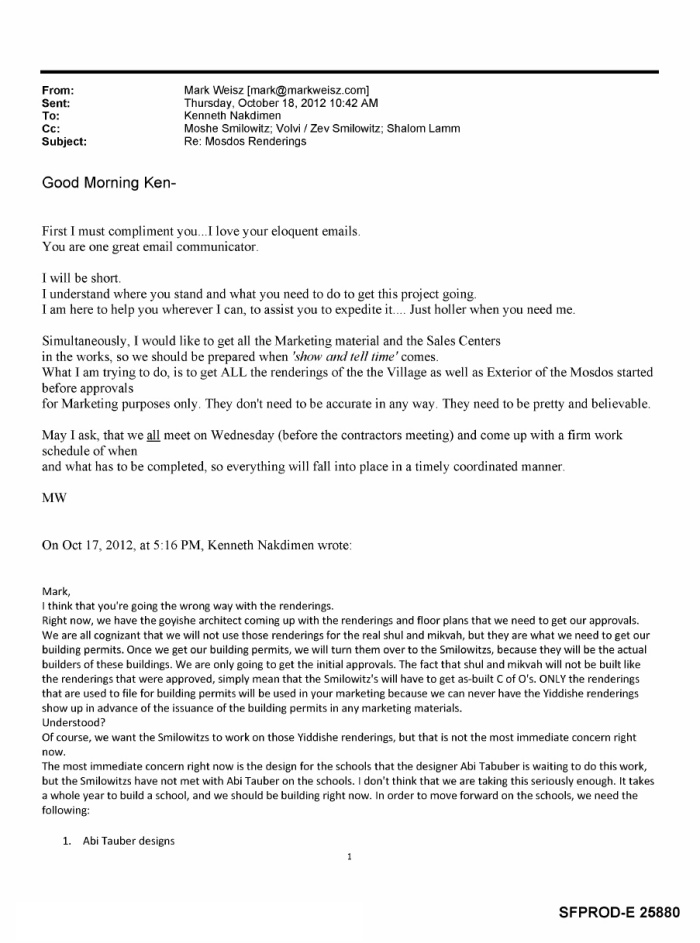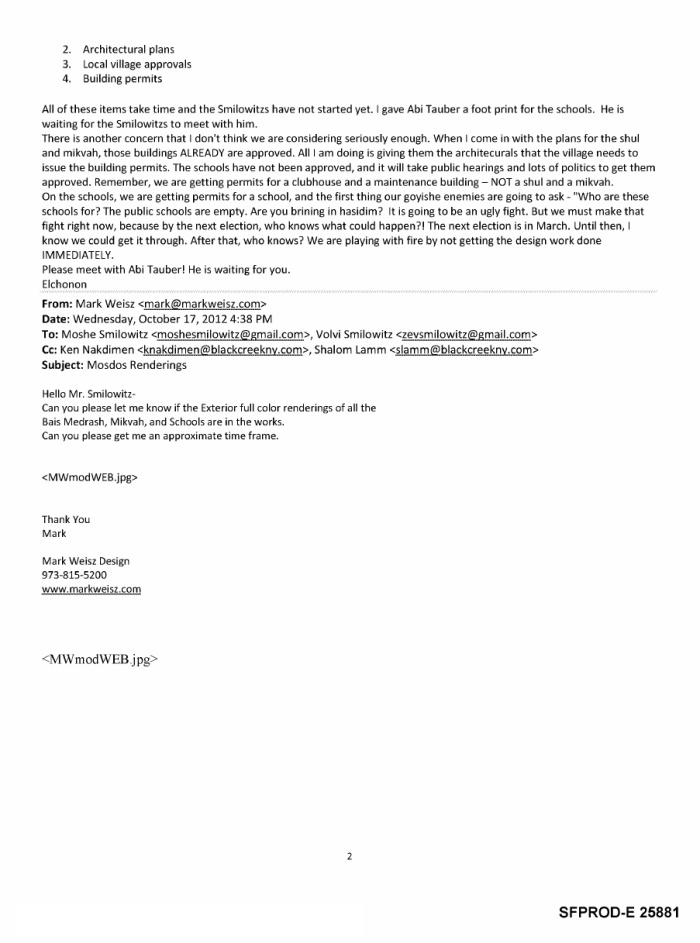“Mendel Taub perched his pocket radio on a warehouse shelf as he began his 12-hour workday packing handfuls of hard candies into cardboard boxes. The volume was set just loud enough to hear Rush Limbaugh’s latest rant.
“Knowledge…is…power,” Taub, 16, said slowly, repeating the WABC radio tag line.
Though born in New York, he was illiterate in English. Desperate to expand beyond his native Yiddish, Taub secretly turned Limbaugh into a surrogate English teacher. That was five years ago.
What he is doing was (and still is) risky because of where he is doing it.
Taub is from New Square, an all-Hasidic village of 7,500 in Rockland County. The Skverer sect there is one of the most insular religious communities in the country. Its powerful grand rabbi (or rebbe) dictates nearly every aspect of his followers’ lives. The secular world and its conduits — smart phones, televisions, Internet connections — are generally banned.
Taub dropped out of his yeshiva at age 15 without the ability to speak or read English fluently, subtract double digits or name the 50 states. Teachers and rabbis dismissed his questions about the fundamentals of his sect’s beliefs. When he persisted, he was disciplined.
“I realized I wasn’t getting an education, that nothing they taught me would ever come in handy in getting a career or bringing in money for my family,” he said. “I realized that Talmudic law wasn’t really going to help me get a job.”
So he convinced a peddler who mostly trafficked in watches and calculators in the village to sell him a radio.
“It went down like a drug deal, on a street corner, in the shadows,” he said.
If he were caught by religious authorities, he could ruin his chances of getting a desirable match in his sect’s customary arranged marriages or risk becoming ostracized from everyone he knew.
At 16, after months of low-wage manual labor, he gathered the courage to secretly call the public school administration: “I said, ‘Hello … public school … Ramapo…?’”
He believes he reached an East Ramapo school administrator. “I said, ‘I’m a kid from New Square. I want a high school education. Can I come to school? What do I have to do?’ They said, ‘You might be here the next 15 years because your English and math are like a first grader’s. Go to Rockland BOCES when you turn 17. You won’t need your parents’ permission. They’ll do the job,’” he said.
“At that point, all I wanted to do was learn English. I didn’t think I’d be able to master math, science or social studies. I was clueless. I didn’t know anything about anything,” Taub said, sitting in an ambulance where he works part-time for the Ramapo Valley Ambulance Corps.
he next day, he called Albert Moschetti, the BOCES’ adult education director at the time.
“The first time I met Mendel, I put my hand out,” Moschetti recalled. “He didn’t know what to do with it. Hand-shaking wasn’t natural for him.”
On his 17th birthday, Taub enrolled at the Board of Cooperative Educational Service. The pursuit of secular studies was so forbidden in New Square that, when Taub confessed to his older brother, Abraham, that he was about to begin at BOCES, he received a bigger shock than he delivered.
His brother had already earned his high school equivalency diploma there and was studying at Rockland Community College.
“I almost dropped dead,” Taub recalled. “I viewed my brother as a nice Hasidic man who didn’t even speak English. I looked down on him a little. I thought, ‘He doesn’t understand what I understand.’ And then there he goes. I was very proud.
“He swore me to secrecy,” said Taub, now an undergraduate student at Pace University in Pleasantville on full scholarship with his sights set on law school.
Path to success
Taub is among a growing group of ultra-Orthodox Jews whose thirst for secular knowledge has led them to an educational passageway from their deeply religious communities to the wider world: Rockland BOCES, a state-backed education program, and Rockland Community College, a State University of New York school.
In recent years, roughly 40 ultra-Orthodox students (mostly young men) attended BOCES each year, an increase from 10 years ago when there were only a handful, Moschetti said. They come from Hasidic enclaves in Monsey and Spring Valley, in addition to the most insular New Square. Many were educated in East Ramapo’s private religious schools.
What was once utter taboo has become more familiar in some Hasidic communities, if not entirely accepted.
It varies, depending on the community,” said Rabbi Mayer Schiller, a Hasidic Monsey resident and lifelong educator. “The ultra-Orthodox also have a center, a left and a right. Even in the hard-core right, if it’s done out of the limelight with no ill effect on the religion, it may be accepted.”
Pinches Dirnfeld, 30, a doctoral student in mathematics at the University of Utah, was among the first teenagers to sneak out of New Square 10 years ago to begin courses at BOCES. Shulem Deen, 42, who chronicled his own journey in his best-selling memoir “All Who Go Do Not Return,” pursued secular studies shortly after.
“Before I went, nobody did,” said Dirnfeld, who attended RCC and later earned a masters’ degree at Columbia. He has encouraged others to follow his path, including his brother, now an RCC student. “Overall, there are a lot more kids who go nowadays than 10 years ago.”
an Newhem taught English composition and journalism to many former BOCES students at RCC for 17 years. He said that, for vulnerable students seeking to step beyond their tightly knit communities, BOCES and RCC provide “a place and people who can safely and appropriately and with dignity and respect help those people out of situation they feel trapped in.”
As Taub put it, “It was kind of a tunnel to success.”
A spectrum of stringency
Though he is not observant, Taub has remained in his parents’ home. Former friends stopped talking to him. Most people treat him as an outcast. However, he was ultimately left in peace to pursue his own life
“Mendel is remarkable. He has no bitterness toward anyone,” said Thomas Della Torre, RCC’s associate vice president for academic and community partnerships. “His attitude is: This is what’s best for me and I want others to know it’s available to them.’”
Abraham Taub, who is studying to become an emergency-room doctor, is still very much part of the New Square community, with a wife, three children, his own home and a business selling booths for security guards and parking attendants. His children attend New Square’s yeshiva. He was already married when he began sneaking to classes at BOCES, and later RCC. After winning a SUNY Chancellor’s Award for academic excellence, he became slightly more open about his doings. Mendel Taub said the community begrudgingly tolerated his brother’s pursuits.
“He wasn’t considered an instigator. He didn’t change his appearance or try to ‘corrupt’ anyone,” Taub explained.
Now commuting to NYIT College of Osteopathic Medicine on Long Island, Abraham Taub has been a role model for his younger brother.
“He has helped me a lot. At first, I didn’t know what a GPA was, anything about the Greek system or what classes to take. He’s been a great brother,” Taub said.
“It’s becoming more and more acceptable to pursue a college education,” said Naftuli Moster, founder of Yaffed, an advocacy group dedicated to improving secular education in Hasidic and ultra-Orthodox schools. “Several grand rabbis have already told their constituents (just married men) to pursue such training, especially vocational training.”
Monsey resident Chaya Wagschal, an RCC student who grew up loosely affiliated with the Satmar sect of Hasidism still embraces her community’s values and practices. Her pursuit of a college degree is rare among her peers: she has enjoyed support from her parents and community.
“Being Hasidic is very much about being accepting of every fellow Jew, regardless of his or her ideals, level of religious observance, or place in society,” Wagschal said, sitting in an RCC library meeting room. “It is those ideals that I find so charming about the Hasidic culture. Being a part of a Hasidic community is like being part of a big family that looks out for you, and is there to catch you when you fall.”
Educational deficiencies
Yeshivas are non-profit religious institutions dedicated to the study of Jewish texts, particularly the Torah and Talmud. Educational standards vary tremendously among the 100 East Ramapo yeshivas that serve 24,000 students. Some offer advanced secular studies, others none at all.
In some cases, boys don’t learn the alphabet until they are 8 years old. At that point, English and math coursework is squeezed into 90 minutes, a few times a week at the end of the day. Generally, around age 13, boys begin to focus exclusively on religious studies.
“Most men graduating from Hasidic yeshivas are severely disadvantaged due to their illiteracy in basic subjects that are taught in most public and non-public schools,” Yaffed’s Moster said. “This includes being able to speak and write in English, understanding what college is or how it works, being able to prepare for a job interview and to actually qualify for most average-paying jobs outside of the community itself.”
Girls, who do not study the Talmud, receive more well-rounded studies.
Such was the case for Wagshal, who had sufficient English and other studies to skip BOCES and go straight to RCC.”









